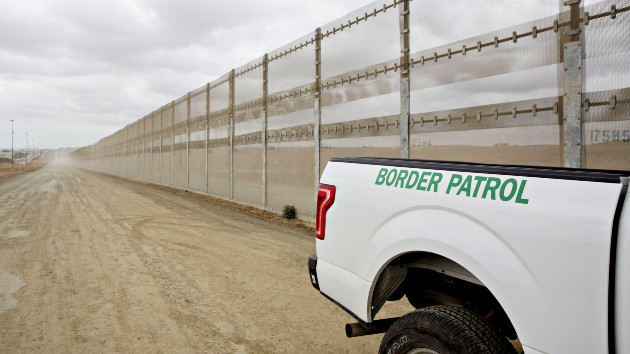(NEW YORK) — Sal, a U.S. Customs and Border Protection employee, was going through a difficult time in his life when he first started at the agency. His mother was being physically abused by her partner, he said — and that was the tipping point.
“So one day at work … I’m just pacing back and forth and I have a miserable look on my face,” Sal, who was not identified by his last name, said during a Customs and Border Protection (CBP) podcast in September 2021. “And someone overheard me say, ‘I want to eat my own gun."”
His life was saved, he recalled, after a coworker noticed that he wasn’t doing well and called to check in on him. His supervisors came to his apartment and made the decision to take his firearm away, helping him get the help he needed.
He was put on light duty and was able to attend counseling sessions, with people who checked in on him regularly, he said.
On the CBP podcast, Sal said that he and others worried their personal struggles could be a professional liability.
“The big thing is a lot of officers, they think that if they get depressed or they’re going through a difficult time that they can lose their job or that they’re going to be embarrassed,” he said. “And the entire time, that wasn’t the case. If anything, my situation got 10 times better at work because of this.”
He called it a “silver lining.”
“You’re not going to lose your job because you’re going through a difficult time. And there is nothing to be embarrassed about because, I don’t care how much money you have or what your job is or, you know, anything that you do in life — everybody gets depressed. Whether you’re the president of the United States, the biggest rock star in the world, you’re a surgeon. It doesn’t matter,” he said last year. “Everybody gets depressed.”
Though Sal was saved from his crisis, this year saw the most Customs and Border Protection agents die by suicide since 2009 — a total of 14.
CBP Executive Assistant Commissioner Benjamine “Carry” Huffman told ABC News the situation was “concerning” and that he believes there isn’t one factor that’s contributing to the increase in suicides.
Both he and a doctor at the agency, however, highlighted problems with stigma around mental health and the need to encourage officers to get help.
“Law enforcement is a challenging profession,” Huffman said.
“The things that we face and things that we do on a day-to-day basis, that we ask our workforce to do, is very difficult. Whatever crisis the nation is facing, we face it first. Whether it’s this big surge of migrants, whether it’s dealing with the first contact with people with COVID or other disease or whatever is going on. We’re the ones that come see it first, and those things are all contributing factors,” he said.
Huffman said the agency is hoping to destigmatize seeking help when people aren’t feeling well enough to work, including if they are dealing with mental health issues — the very outreach that Sal said last year had helped him. Huffman said he has held 60 town halls over the past year with the CBP workforce.
“We have a culture of toughness,” he explained. “We ask our people to do dangerous things in dangerous places, go places where other people won’t go, do things they won’t do to keep Americans safe.”
The downside, he said, is that sometimes that toughness “deters” people from reaching out — something he said he is trying to change. When an agent breaks their leg or gets a physical injury, they go on leave to get better; and Huffman said there is no difference with mental health.
“If you have some sort of a mental crisis, we need to change the culture where we have that same thought process: You get the help you need to get it fixed, you get back from job and you’re good to go,” he said. “That’s the message we’re trying to say is it’s no different between those things — getting a physical injury or a mental injury — and treat them the same way and just have that same acceptance of your peers.”
The way the agency handled such issues in the past, he said, sometimes made the situation worse. Now, though, officials are trying to empower their officers.
Huffman said the influx of migrants along the southwest border isn’t going to impact the way CBP handles officer suicides, and they are offering the same help as they did before.
CBP is one of the only federal law enforcement agencies to have a suicidologist on staff. His name is Dr. Kent Corso.
“Culture change is by far the biggest challenge,” Corso told ABC News. “And some of the things we’re doing about that [are] we are hiring over a dozen operational psychologists. So these are specialists who are there to help consult with management, with employees. We have a new process in place, a policy that has come out of the commissioner’s office, that teaches managers how to slow the process down.”
When new recruits are at the academy, CBP officials work to make sure to let them know that it is OK to not be OK — part of the shift Corso and Huffman talked about.
Corso said the work environment is contributing to some of the challenges officers are facing.
“The last few years have been unprecedented,” he said, adding, “There are many changes going on. There is high unpredictability. And what we know from the psychology research is that when things become less predictable — that is to say, people perceive less control — it’s just more stressful. Add on to that the idea that everybody’s watching the border, it’s a bit of a fishbowl, if you will, that just makes things difficult.”
Copyright © 2022, ABC Audio. All rights reserved.












